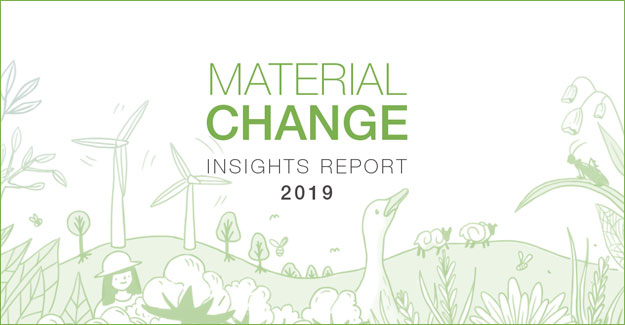
Textile Exchange Launches The Material Change Insights Report
New report analyses the textile industry's progress toward more sustainable materials uptake and articulates a vision for post-Covid-19 materials strategies. Textile Exchange launched its 2019 Material Change Insights Report, which surfaces valuable insights about the state of fibre and materials sourcing in the textiles sector in the context of the Covid-19 pandemic. The report draws on exclusive data provided through Textile Exchange's Corporate Fiber & Materials Benchmark (CFMB) programme, the largest peer-to-peer comparison initiative in the textiles sector with more than 170 voluntary brand participants. The CFMB programme fills a necessary industry gap by rigorously analysing self-reported company data to track the materials sourcing progress of individual companies as well as the industry at large. The resulting Material Change Insights Report provides one of the most data-backed and comprehensive analyses of how the industry is progressing in its shift to preferred materials, as well as alignment with global efforts like the Sustainable Development Goals (SDGs) and the transition to a circular economy. It builds on Textile Exchange's Material Change Index (MCI) - a family of indices, published earlier in the year, that tracks individual company progress. The 2019 report was authored by Textile Exchange's Fiber and Materials team, with circularity content developed with global consultancy Corporate Citizenship and support from media partner GreenBiz. A series of webinars will be held in June to dive deeper into the report's findings. The Material Change Insights Report, MCI and other CFMB programme components ladder up to Textile Exchange's overall 2030 Strategy: Climate+. By benchmarking the industry and providing actionable tools for improvement, Textile Exchange is pushing a race to the top as a driving force for urgent climate action. Key 2019 Report Insights The 2019 Material Change Insights Report is based on companies' self-reported data from 2018. Key findings include:
- Reporting companies sourced nearly 40% of their materials from preferred sources in 2018.
- Reporting companies collectively converted 1.7 million metric tons of materials to preferred in 2018, resulting in a saving of 1 million metric tons greenhouse gases.
- Sweden is leading the race to the top, with 12 Swedish headquartered companies accounting for 40% of the preferred materials reported.
- 66% of companies said they have started aligning their business strategy with the SDGs. However, 71% have not set measurable targets within their goal alignment.
- 86% of companies responding to the circularity module have a circularity strategy - but coverage and investment are still very limited. For example, only ~0.06% of reported recycled materials come from post-consumer textile waste.
Textile Excellence
If you wish to Subscribe to Textile Excellence Print Edition, kindly fill in the below form and we shall get back to you with details.













